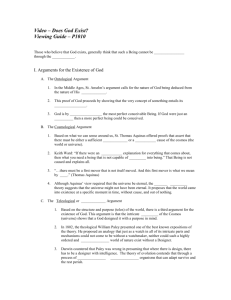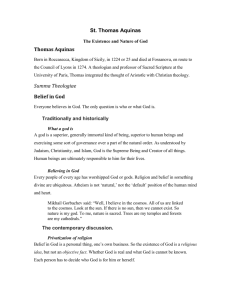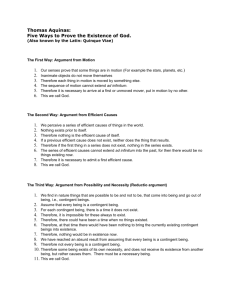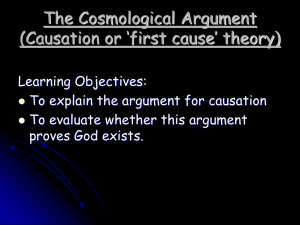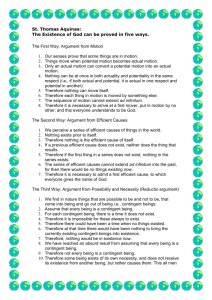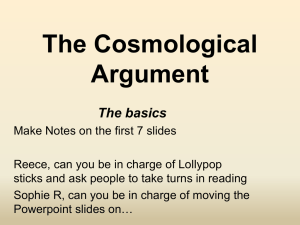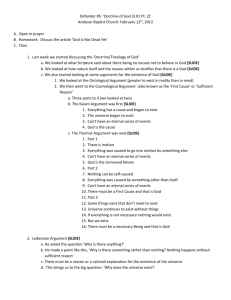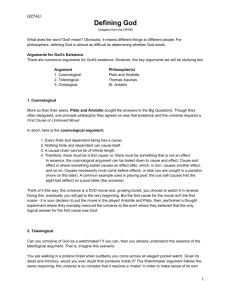Aquinas - University of Arizona
advertisement
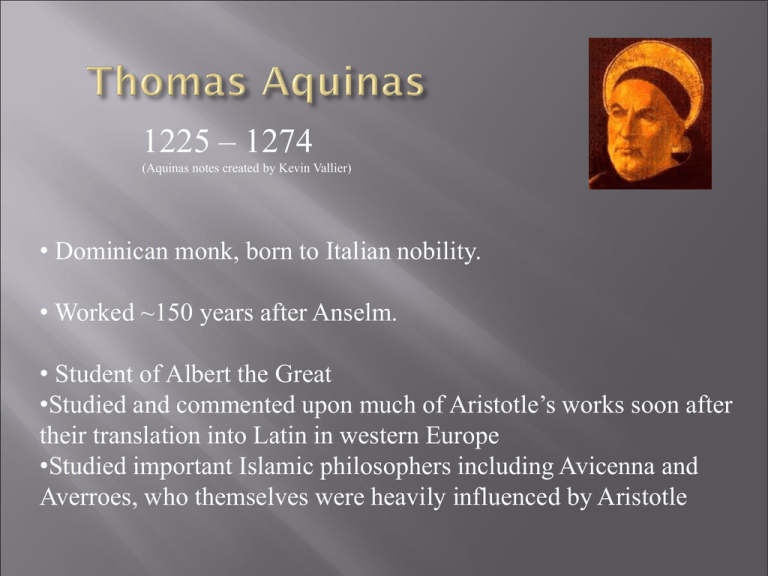
1225 – 1274 (Aquinas notes created by Kevin Vallier) • Dominican monk, born to Italian nobility. • Worked ~150 years after Anselm. • Student of Albert the Great •Studied and commented upon much of Aristotle’s works soon after their translation into Latin in western Europe •Studied important Islamic philosophers including Avicenna and Averroes, who themselves were heavily influenced by Aristotle “Granted that everyone understands that by this word “God” is signified something than which nothing greater can be thought, nevertheless, it does not therefore follow that he understands that what the word signifies exists actually, but only that it exists mentally. Nor can it be argued that it actually exists, unless it be admitted that there actually exists something than which nothing greater can be thought….” (Summa Theologica I.II.I) • Anselm’s argument rests on his definition of god as “that which nothing greater can be conceived.” • Aquinas rejects the a priori Ontological argument on the grounds that a word’s meaning cannot alone establish the existence of that to which the word refers. • Rather, Aquinas requires existence proofs be empirical/ a posteriori, ie. to require observational evidence. (1) Cosmology = the empirical study of the universe considered as a whole system (1) Eg, Hubble’s (1929) discovery that the universe is expanding rather than in a steady or static state (2) Eg, Einstein’s (1915) identification of gravity the curvature of space/time (3) Eg, The “big bang” theory of the origin of the universe (2) A cosmological proof for the existence of God derives God’s existence from facts established by cosmology • Form of a cosmological argument: • By observation of the universe or parts of the universe we know a posteriori that the universe or parts thereof have property P • The best explanation of P is the hypothesis that God exists. • Therefore, God does exist 5 1. 2. 3. 4. 5. Argument from motion Argument from efficient causation Argument from possibility and necessity Argument from gradation Argument from governance 1. There is motion. 2. Motion involves the reduction from potentiality to actuality. (eg: an activated spring on the garden gate) 3. So all motion was first potentiality. 4. Only what is actualized in some regard can reduce something from potentiality to actuality in that regard. (eg, the squirrel that releases the coiled spring on the gate) 5. Nothing can reduce itself from potentiality to actuality. 6. Nothing can move itself. 7. There cannot be an infinite sequence of movers. There must be an unmoved prime mover, i.e. God. 1. The sensible world is full of the effects of efficient causation. 2. Nothing can be an efficient cause of itself. 3. If a thing’s cause is absent, then it cannot exist. 4. Efficient causes are ordered: 1st -> intermediate -> (ultimate) effect. 5. So without a first cause, there cannot be (ultimate) effects. 6. So there must be a first efficient cause, i.e. God. 1. The arguments from motion and efficient causation deny that anything can move or cause itself – except God. However, what establishes this exception? Rather, why should we not simply say that the sequence of causes/movers is historically infinite? 2. Also, Aquinas’ arguments do not demonstrate that • a single thing is responsible • the first cause in any way resembles the JudeoChristian god • the thing responsible still exists 1. Some natural things exist contingently. 2. For each contingent thing, there is a time at which it does not exist. 3. If everything were contingent there would be a time in the past when nothing existed. 4. If there were such a time, then nothing would now exist. 5. So, something must exist that is not contingent but rather necessary and which gives rise to all things. This necessary being is God. • Even if each particular object in the history of the universe exists contingently, it does not follow that there must be a time when no contingent objects exist. 1. Everything is comparable /commensurable with respect to value and being. 2. There is a gradation in these properties, especially value. That is, some things are better than others. 3. One thing is better than another only if the former is more similar to that which is perfect than is the later. 4. So, since things are comparable with respect to value, there must exist that which is perfect, and this can only be God. 1. The third premise is critical to the argument. However, this premise is dubious. What reason secures that variation in value presupposes the existence of the standard of perfection? Notice that there are many examples of comparability that do not presuppose the existence of the relevant standard: e.g. one thing can be taller than another without it being the case that there exists any (third) object on which the comparison depends. 1. Some natural unintelligent objects have purposes. (E.g. the purpose of the heart is to pump blood; the purpose of the wing is to enable flight.) 2. Purpose is always the result of intelligence. 3. The purpose of some natural unintelligent objects was not established by any natural intelligent being (such as a human). 4. So, there must be a supernatural intelligent being responsible for such purpose, and this is God. Is it correct that objects have purposes in the sense required by the argument? If objects do have purposes in the sense required by the argument, might these purposes not be established simply by the unintelligent processes of evolutionary biology?


